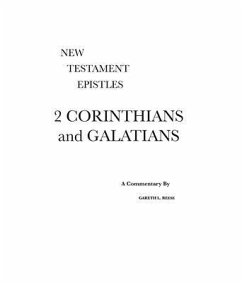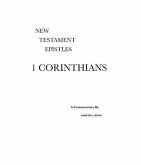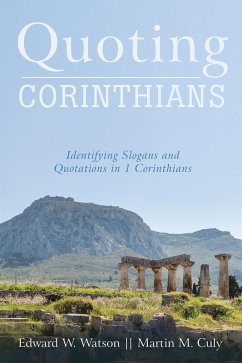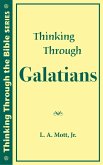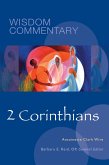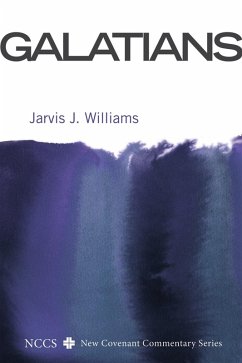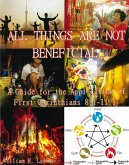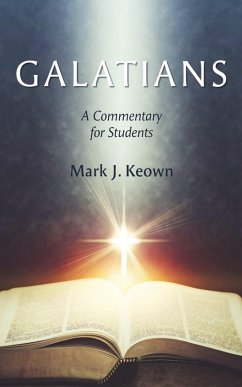This is a phrase-by-phrase commentary and exposition of the New Testament books of 2 Corinthians and Galatians. This commentary is in use as a college textbook, yet is suitable for the lay church member.
2 Corinthians and Galatians were both written by Paul during the same period of his life, to different churches wrestling with similar, thorny issues. The threat to New Testament Christianity posed by Judaizers is rightly framed by the information learned from 2 Corinthians and Galatians. Time and again in 2 Corinthians, Paul emphasizes his apostolic message and authority, insisting that the new covenant gospel which reflects the truths Jesus taught is what is now to be preached. According to Paul, the new covenant Scriptures are our rule of faith and practice. In Galatians, Paul examines what is involved in the faith that God looks for as He would justify men who have sinned. Is it faith alone (i.e., knowledge, assent, and trust), or is it a faith that includes obedience to what God has said? In his words to Peter - "a man is not justified by works of the Law but through faith in Christ Jesus" (Galatians 2:16) - Paul persuasively demonstrates that the faith that saves is habitually doing what God says, not walking by man-made religious rules. The Judaizers, who championed rules like the Pharisees taught, were distorting the gospel message as preached by the apostles of Jesus (Galatians 1:7).
This commentary is conservative evangelical Christian in its outlook, yet skillfully examines the Scriptures from multiple theological viewpoints. Introductory Studies cover authorship and attestation, the place and date of writing, original target audience to whom the letters were addressed, and the original purpose for writing. Two extended Special Studies address issues crucial to our understanding of how God deals with people He would save:
Since this commentary presumes the God-inspired nature of all Biblical writing, the author seeks to harmonize the teachings of 2 Corinthians and Galatians with other relevant Scriptures, and also helpfully examines the original language in which the epistles were written. A fully annotated bibliography of other commentaries is included to encourage readers to extend their own studies.
This commentary continues the author's series on the books of the New Testament, and is written from the unique standpoint of the Restoration Movement, a position which allows him to approach Scripture with no special theological doctrine or dogma to defend and explicate. This approach provides an unhindered freedom to listen to what the Holy Spirit would tell us within the pages of the sacred Scriptures. By deliberately employing the time-honored grammatico-historical method of interpretation, the Word of God is allowed to impress upon our minds the intent the Divine Author had in mind.
The author is Professor Emeritus of the New Testament at Central Christian College of the Bible (Moberly, MO).
2 Corinthians and Galatians were both written by Paul during the same period of his life, to different churches wrestling with similar, thorny issues. The threat to New Testament Christianity posed by Judaizers is rightly framed by the information learned from 2 Corinthians and Galatians. Time and again in 2 Corinthians, Paul emphasizes his apostolic message and authority, insisting that the new covenant gospel which reflects the truths Jesus taught is what is now to be preached. According to Paul, the new covenant Scriptures are our rule of faith and practice. In Galatians, Paul examines what is involved in the faith that God looks for as He would justify men who have sinned. Is it faith alone (i.e., knowledge, assent, and trust), or is it a faith that includes obedience to what God has said? In his words to Peter - "a man is not justified by works of the Law but through faith in Christ Jesus" (Galatians 2:16) - Paul persuasively demonstrates that the faith that saves is habitually doing what God says, not walking by man-made religious rules. The Judaizers, who championed rules like the Pharisees taught, were distorting the gospel message as preached by the apostles of Jesus (Galatians 1:7).
This commentary is conservative evangelical Christian in its outlook, yet skillfully examines the Scriptures from multiple theological viewpoints. Introductory Studies cover authorship and attestation, the place and date of writing, original target audience to whom the letters were addressed, and the original purpose for writing. Two extended Special Studies address issues crucial to our understanding of how God deals with people He would save:
- Readers are introduced to the Dead Sea Scroll referred to as 4QMMT and the subject of "works of the Law." Particularly, the study demonstrates how 4QMMT helps us rightly understand Paul's contrast of faith v. works of the Law.
- The doctrine of Justification by Faith is also given extended treatment, and key theological questions are addressed. Biblically, what is "justification" and what is "faith"? Is sola fides (faith alone) the condition upon which God justifies sinful men? How and how often is justification applied to men by God? And how has our understanding of the New Testament been impacted by the New Perspective on Paul that has dominated theological discussions for the past 30+ years?
Since this commentary presumes the God-inspired nature of all Biblical writing, the author seeks to harmonize the teachings of 2 Corinthians and Galatians with other relevant Scriptures, and also helpfully examines the original language in which the epistles were written. A fully annotated bibliography of other commentaries is included to encourage readers to extend their own studies.
This commentary continues the author's series on the books of the New Testament, and is written from the unique standpoint of the Restoration Movement, a position which allows him to approach Scripture with no special theological doctrine or dogma to defend and explicate. This approach provides an unhindered freedom to listen to what the Holy Spirit would tell us within the pages of the sacred Scriptures. By deliberately employing the time-honored grammatico-historical method of interpretation, the Word of God is allowed to impress upon our minds the intent the Divine Author had in mind.
The author is Professor Emeritus of the New Testament at Central Christian College of the Bible (Moberly, MO).
Dieser Download kann aus rechtlichen Gründen nur mit Rechnungsadresse in A, D ausgeliefert werden.

